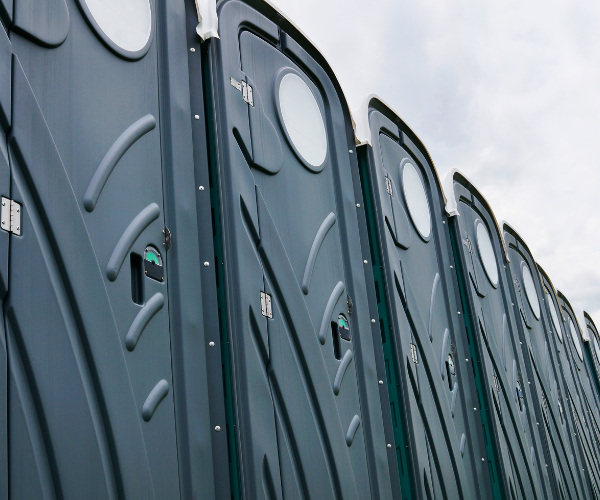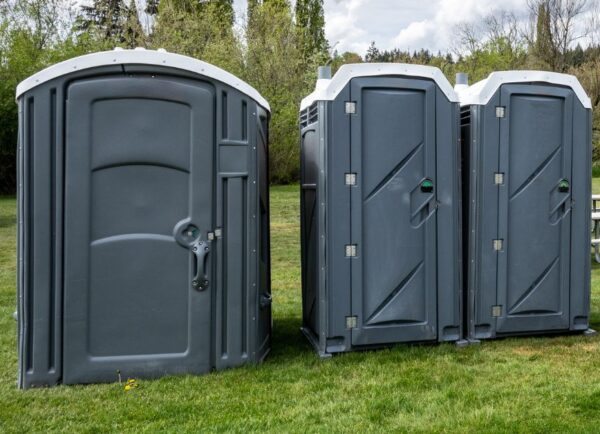Portable toilets present numerous eco-friendly advantages, crucial in fostering sustainable environmental practices. Traditionally, permanent restrooms often require extensive water usage and infrastructure, resulting in a significant environmental footprint. In contrast, portable toilets operate independently of piped water systems and electricity, significantly lowering water consumption.Furthermore, portable toilets ensure waste is isolated and collected for proper treatment. This controlled disposal process reduces the risk of contamination and mitigates environmental pollution, valuable in events or construction sites where facilities are remote.Opting for portable toilets can also minimize soil erosion and habitat disruption, particularly in sensitive areas. Since these units are temporary, they can be placed without deep excavation, preserving the natural landscape. They leave minimal trace after removal, maintaining site integrity for future ecosystem dwelling.Beyond this, the modern design of portable toilets includes innovative features like biodegradable materials and efficient deaeration systems that optimize breakdown and odor control. Manufacturers focus on utilizing recycled or renewable materials, aligning with the growing emphasis on sustainability.The compact size and transportability of portable toilets mean they can be conveniently relocated and adapted for changing site conditions or event layouts, reducing the necessity for constructing permanent structures that lead to resource depletion.In summary, renting portable toilets supports ecological preservation efforts by conserving water, promoting responsible waste handling, protecting natural sites, and pioneering sustainable product innovations, making them an environmentally conscious choice for sanitation needs.

Portable Toilet Rentals in Black Mountain, South Carolina
Call today for a free quote (864) 477-7907
Portable Toilet
Fast, Easy, & 100% Free To Get Started
30 Years of Service
With over 30 years of service, LittleJohn Toilets boasts a rich history rooted in Black Mountain, dedicated to quality and community. Our longstanding connections ensure we understand and meet local needs with precision and care.
Unparalleled Quality Service
Our commitment to providing top-notch service is evident in every portable toilet we deliver. LittleJohn Toilets ensures each unit is clean, well-maintained, and ready to meet diverse needs, making us the preferred choice in the region.
Fast and Reliable Delivery
LittleJohn Toilets is synonymous with swift, dependable service. Our efficient processes guarantee timely delivery, allowing you to focus on your event while we handle the sanitation details effortlessly.
Reliable Portable Toilet Rentals in Black Mountain
Call for a Free Quote Today
(864) 477-7907
At Black Mountain's initiative, LittleJohn Toilets provides unparalleled portable toilet services, renowned for reliability, dependability, and local ownership. Our solutions suit a variety of events, whether at bustling construction sites, elegant weddings, or vibrant festivals. We're proud to serve not only Black Mountain but also neighboring regions, ensuring every event remains sanitary and worry-free, supported by our dedicated team committed to customer satisfaction.


Our standard porta john rental units are durable and reliable for any commercial build site, housing development, public works project, or remodel job.Features include dome lighting, grated floors, and an “In-Use” locking mechanism for privacy and comfort. Regularly maintained, inspected, and cleaned by FusionSite at your location.

Developed as an alternative to full ADA-compliant restrooms, the Liberty is a spacious, wheelchair-accessible unit that can also be promoted as a family-sized restroom. Includes a patented flat-floor system for easy wheelchair access and maneuverability.Handrails, paper holder, and rotary latch are designed for simple, intuitive end-user operation.

Portable hand washing stations are essential for keeping your work site sanitary and clean. Features hands-free foot pumps, liquid soap, and paper towels.Perfect for job sites without water hookups, these units can handle hundreds of washes between services.
We Proudly Serve
Standard Portable Toilets
Our Standard Portable Toilets offer a practical and hygienic solution for outdoor events throughout South Carolina.
High Rise Portable Toilets
High Rise Portable Toilets provide convenient, elevated restroom facilities for construction sites in Black Mountain.
Restroom Trailers
Experience convenience with our Restroom Trailers, designed for upscale outdoor events in Black Mountain.
Roll off Dumpsters
Our Roll Off Dumpsters offer reliable and efficient waste management solutions for projects around Black Mountain.
Septic Tank Cleaning
Ensure your system's longevity with our expert Septic Tank Cleaning services available across South Carolina.
Grease Trap Cleaning
Depend on our Grease Trap Cleaning services to maintain functional and sanitary kitchen operations in Black Mountain.
Fencing & Barricades
Enhance site security and crowd control with our Fencing & Barricades service in South Carolina.
Residential Storage
Securely store your belongings with our Residential Storage service, tailored for the Black Mountain community.
Black Mountain's Premium Portable Toilet Supplier
Finding a quote and securing delivery for a portable toilet has never been more convenient. LittleJohn Toilets in Black Mountain makes the process simple and efficient. Visit our website to access easy-to-complete forms located at both the top and bottom of the page, ensuring you can request a quote at your convenience. Beyond requesting quotes online, our experts are also just a phone call away, ready to guide you through customizable options that fit your specific needs.We understand the importance of quick, stress-free service in planning events or managing job sites, which is why our streamlined process caters to your schedule and preferences. Our user-friendly Get A Quote buttons scattered throughout the website simplify the process further, ensuring that service at LittleJohn Toilets remains seamless and customer-focused.Once your request is placed, expect timely follow-up from our dedicated team who will oversee every detail, from initial consultation to on-time delivery. Efficient logistics and prompt delivery ensure your portable toilet arrives exactly when needed, allowing you to focus fully on your event or project, without the hassle of managing sanitation logistics.

Black Mountain, a haven of natural beauty nestled amidst iconic landmarks like the stunning views from Lookout Mountain, deserves only the best for its outdoor gatherings and community events. At LittleJohn Toilets, we provide portable toilets that complement the local allure, offering reliable and clean solutions that blend seamlessly into any occasion. You can count on us to enhance your guest experience, whether at a scenic wedding or the lively Lake Eden Arts Festival. Our service goes beyond providing portable toilets; it's about fostering a sense of community. We're dedicated to supporting and enriching local events, appreciating the cultural fabric of Black Mountain. Our presence at gatherings like the annual Sourwood Festival ensures clean and effective solutions, emphasizing our role as locals committed to offering the finest sanitation services. Choosing LittleJohn Toilets means opting for a partner who understands the rhythms and needs of Black Mountain life. We take pride in delivering top-notch restrooms that support outdoor experiences, simplifying the organization of successful events known for their charm and hospitality.
The Best Choice for Black MountainLittleJohn Toilets stands out as the premier portable toilet provider in Black Mountain, where our passion for excellence aligns with the community's aspirations. Our services are tailored to meet the specific needs of local events, ensuring each gathering is executed with the highest standard in sanitation. We leverage years of expertise to deliver solutions that streamline logistics while adding convenience and reliability to every setting.From weddings to large-scale community gatherings, our portable toilets are equipped to meet varied requirements, always prioritizing cleanliness and dependability. We are committed to providing an exceptional experience for all clients, a testament to our reputation as Black Mountain's trusted partner in portable sanitation.
Swift Services, Every TimeLittleJohn Toilets takes pride in our ability to deliver reliable portable toilet services without delay. Our process is designed to accommodate any situation, ensuring rapid response and on-time deliveries for urgent needs without compromising quality.Reliability You Can Count OnOur fast and dependable service assures you that your portable toilet needs will be met efficiently. This reliability is a critical aspect of what makes LittleJohn Toilets a favored choice for contractors and event planners in Black Mountain, dedicated to ensuring that no detail disrupts the success of your project or event.
Discover Our Portable Toilets in Black Mountain
Renting a portable toilet in Black Mountain is a straightforward process. Begin by navigating to our website, where you'll find forms at both the top and bottom of the page designed for ease of use. These forms require minimal information—just your first and last name, phone number, and email address—to initiate your rental request.The website also features strategically placed 'Get A Quote' buttons, offering a quick method to access our services. Click these buttons to start the process, and our responsive team will handle the rest, providing quotes and detailed service information tailored to your needs.Through these simple online tools, we streamline the process, allowing you to focus on event planning or project management. Our customer support team is likewise readily accessible to provide guidance or answer any preliminary questions you might have, ensuring you're well-informed before placing your order.Rest assured, our commitment to efficiency means timely quotes and seamless transitions from inquiry to delivery. With a focus on transparency and customer satisfaction, we ensure that renting portable toilets for any setting in Black Mountain remains a hassle-free experience.Take the stress out of planning by utilizing our online tools or reaching out directly to our specialists, who are prepared to assist with your unique requirements and deliver results that meet and exceed expectations.
Understanding the delivery timeframe for portable toilet orders is crucial for successful planning. At LittleJohn Toilets, we prioritize prompt service, emphasizing the importance of timely deliveries to maintain seamless event operations.Typically, we recommend placing an order at least one to two weeks prior to the event date. This timeframe allows us to schedule deliveries with precision, ensuring that you receive units well ahead of time for installation and setup. Our inventory and network enable us to cater to both large-scale events and smaller gatherings efficiently.It's our practice to accommodate urgent requests whenever possible. If you find yourself in need of immediate service, reach out to our team. Our proactive customer support can often adjust schedules to fit last-minute needs, demonstrating our flexibility and commitment to meeting client expectations.Our delivery schedule is designed to adapt to your specific timing preferences. Whether you're preparing for a wedding, a corporate function, or a construction project, we align our services to your agenda, providing peace of mind that your sanitation needs are covered.Combining our logistical expertise with a focus on reliability, LittleJohn Toilets ensures that your portable toilets arrive exactly when and where you need them, allowing your team to focus on other critical event details without concerns over restroom availability.
Yes, we can service any type of event or construction services. Our team at LittleJohn Toilets is equipped to handle a wide array of needs, ensuring that whether it's a festival, sporting event, wedding, corporate gathering, or family reunion, you have the right sanitation solution on hand.We offer a versatile range of products, including luxury restroom trailers for upscale occasions, standard porta potties, and specialized units such as ADA-compliant models to accommodate diverse requirements. For construction sites and large outdoor venues, our services expand to roll off dumpsters, fencing and barricades, holding tanks, portable sinks, and hand sanitizer stations.Our ability to provide comprehensive support means that you're never limited by scale or scope when considering portable sanitation for your event. With a focus on quality and customer satisfaction, we ensure that every unit is delivered clean and in excellent condition, ready to enhance the comfort and convenience of your guests or staff.Detailed consultations allow us to customize our offerings to perfectly suit the theme and logistical demands of each occasion. Trust LittleJohn Toilets to deliver excellence in environmental management, creating a setting that aligns with your vision and operational needs, no matter the challenge.

